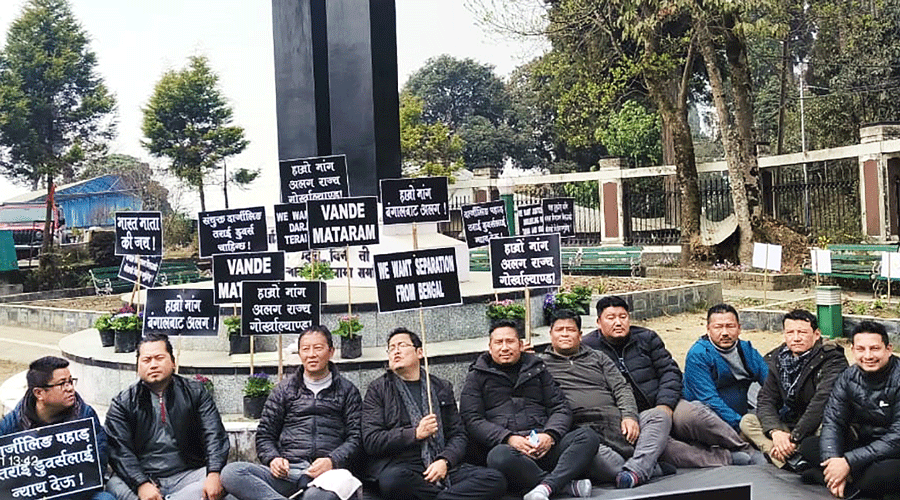All nine Opposition members at the Gorkhaland Territorial Administration (GTA) Sabha on Tuesday called for a 12-hour general strike in the Darjeeling hills on Thursday to protest against the Bengal Assembly’s resolution against the further division of the state.
But the strike call on Gorkhaland after a gap of over five years was soon overshadowed by chief minister Mamata Banerjee’s announcement later in the day that land rights would be given to the residents of all tea gardens in north Bengal within six months.
Around 70 per cent of the people in the hills live in tea gardens and don’t have rights to the land on which they have been living for several generations. The lack of land rights is one of the reasons cited for the Gorkhaland demand.
The nine GTA Sabha members called for the strike when they began a 24-hour fast before the Gorkhaland martyr’s column near Gorkha Rangamanch Bhavan in Darjeeling to protest against the Assembly motion passed on Monday.
“The hunger strike is in protest against the motion. We also call a 12-hour general strike on Thursday. To oppose the bandh is to oppose our own people,” said Binay Tamang, an Independent GTA Sabha member who is among the fasting nine.
The agitation is not called by a single party but by the nine GTA Sabha members. Six of them belong to Ajoy Edwards’s Hamro Party. One member is from Bimal Gurung’s Gorkha Janmukti Morcha and the other is an Independent.
The motion in the Assembly did bring the statehood issue back into the public domain in the hills after the 104-day general strike in 2017. The government was aware of the possible tremor that it would create in hill politics, said a source.
“There is no doubt that the Opposition camp is looking at gaining traction from the resolution issue, but things do not seem as easy given the present political atmosphere in the hills,” said an observer.
According to him, the state government’s announcement on granting land rights to tea garden workers later in the afternoon may have nipped the strike call on the statehood issue in the bud. The land rights issue is very important in the hills, especially in the rural belt.
Mamata Banerjee, who reached Siliguri in the afternoon, didn’t waste any time in contesting the strike call. She distributed land rights to around 1,000 tea garden dwellers from four north Bengal districts.
Mamata said her government was committed to covering all tea gardens of north Bengal in the next six months and the specific time frame brought loud cheers.
The chief minister then came down heavily on the politics of bandh. “If some think that their political programme is to show their strength, I will clearly state that there will be no bandh,” said Mamata, adding that while everyone had the right to protest, it could not be at someone’s cost. The chief minister also brought forth the issue of board examinations that would start on Thursday.
“If students can’t reach or sit for the examinations, who will take responsibility?” asked Mamata who directed the administration to act sternly if public life was disrupted.
The Opposition camp was quick to add that educational institutions had been exempted from the strike but many in the hills did voice their concern over holding a bandh on a day examination starts.
“There will be no picketing as well. We are appealing to the people to participate in the strike on their own,” said Ajoy Edwards.
Anit Thapa, the president of the Bharatiya Gorkha Prajatantrik Morcha, which runs the GTA, however, said it was surprising that a strike was being called in the hills again.
“People are fed up with strikes. I am surprised that leaders who were against strikes are calling a strike just for their political benefits,” said Thapa.
Edwards as well as Binay Tamang were against strikes till some months ago. Asked about the change in his stand, Edwards said: “This is not a decision taken by any party but a collective decision of all Opposition GTA Sabha members.”
The Gorkha National Liberation Front said it would not support the strike.











